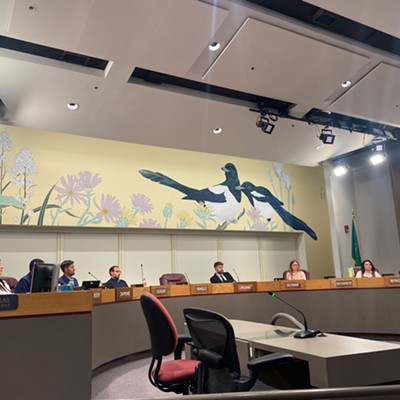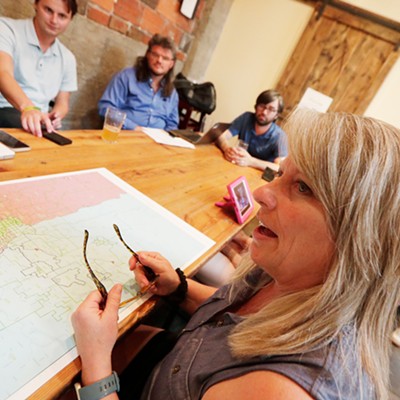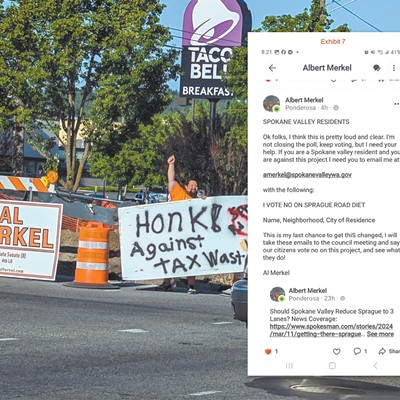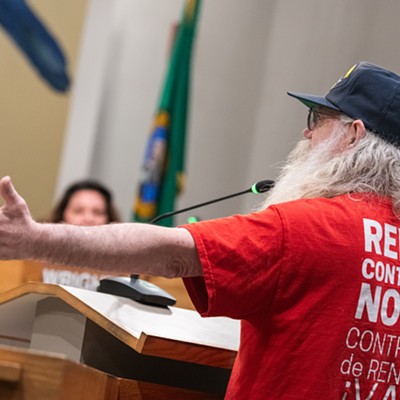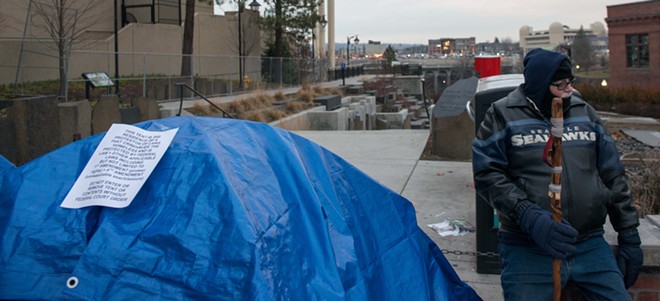
The fight over the city of Spokane's homelessness has often been portrayed as falling into two camps: There are those who think the city of Spokane's approach has been too soft, too willing to hand out food and shelter without the "tough love" they believe would lift homeless people out of the cycle of poverty; and there are those who think Spokane has been too harsh, too willing to criminalize homelessness by clearing out camps and banning people from sleeping on the sidewalk.
But there's a third camp, powerful enough that they can turn the fights between the other two moot: the courts.
Look no further than the lawsuit filed yesterday by attorney Jose Trejo of the Northwest Justice Project, arguing that, in December when the city evicted Camp Hope — the homeless encampment and protest that cropped up outside City Hall — it illegally confiscated possessions and violated the Fourth, Eighth and 14th Amendments of the Constitution.
Trejo represents a family, David Ham, Cynthia Ham-Sanchez and Michael Ham, who stayed at Camp Hope from Nov. 20 to Dec. 9. Camp Hope started as a protest by activist Alfredo LLamedo against the city's policy prohibiting sitting or lying on sidewalks in the downtown core during most time periods. The City Council suspended the sit-lie policy until several warming shelters opened up.
After all, the 9th Circuit Court of Appeals has ruled that it's illegal to enforce anti-camping ordinances when there isn't space available at low-barrier homeless shelters. The opinion ruling that such ordinances violate the Eighth Amendment began with the famous caustic Anatole France quote: “The law, in its majestic equality, forbids rich and poor alike to sleep under bridges, to beg in the streets, and to steal their bread.”
The city has relied on the fact that spaces in warming shelters were open as a reason that Camp Hope was able to be evicted.
But Trejo argues that even though there were beds at warming shelters during the evening, the city still failed to meet that threshold. He points out that when the city booted the campers out of Camp Hope, it was in the morning. The warming shelters are only open at night.
Right now, he points out, the city is still enforcing its anti-camping laws, despite not having 24/7 shelter for all populations.
"There's nothing available right now during the day time in particular," Trejo says.
On top of that, his lawsuit stresses the damage done to the family after most of the possessions they own — including "tents, blankets, clothing, personal items, prescription medications, and documents" — were destroyed. He notes that the city's warming shelters didn't have any storage space for the homeless people's possessions.
"The city destroyed their property inappropriately," Trejo says. "There’s no authorization under the municipal code to seize people’s property."
Trejo points to a 2012 9th Circuit Court of Appeals ruling that declared the destruction of a homeless person's property without fair warning was considered an "unreasonable seizure" that violated the Fourth Amendment.
City spokeswoman Marlene Feist says that city lawyers have not yet reviewed the lawsuit and had no comment at this time.
In January, the Inlander raised similar questions about the definition of shelter, and the issues faced by existing warming shelter's lack of storage space.
Meanwhile, as he runs for mayor, City Council President Ben Stuckart has hammered home the court precedent as a reason why providing low-barrier shelters is crucial, especially if you're against homeless encampments.
"We know goddamn well, legally, we have to provide beds or we're going to have camping everywhere," Stuckart said in an interview earlier this year.
As one of his opponents, Nadine Woodward, points to Marysville's treatment-or-jail policy as a model that Spokane should emulate, activists in Snohomish County have warned that cities like Marysville "are vulnerable to lawsuits that could add millions to the cost of their criminalization of homelessness."
In a phone interview last month, Woodward said she supported building daytime shelters, though she'd prefer if nonprofits paid for things like that instead of the city, stressing that "we have to stop as a city providing funds — taxpayer money — to programs that just enable people."
"I don't think there are enough shelters. I don't think there are enough 'housing first' units," Woodward told the Inlander. "The question shouldn't be 'Where are we going to put them,' it should be 'How do we get them the help they need and stop enabling them to live this lifestyle?'"
When pressed on several occasions, Woodward has declined to name any specific social service programs that enable people. Instead, she's promised to do a "line-item analysis" stressing that if there is "any program that does not offer a path out of homelessness or a way off the street, they don't get any money."
(She also has noted, however, that because the city's allocation process for funding nonprofits is made on a five-year schedule, she would be limited in what she could do during her first term.)
"I just wish we had fewer homeless. I wish we had fewer programs that enabled people," Woodward says. "I wish we had more programs that got people off the street and particularly out of their addictions."






